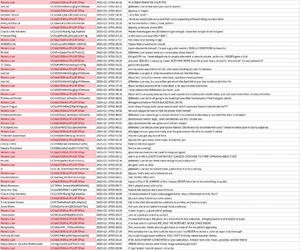She would be a character witness, it is the only thing relevant to the RP process in regards to April. Probably the only thing pertinent that happened before the divorce is his relation to Ashley.
The prosecutor is obviously trying to establish he persecutes every woman he had a relationship with so she can infer and convince the jury of malice on spreading the nude picture.
This is highly unlikely since use of character witnesses is highly disfavored on that side of the pond, as even Nick had to point out in a rare moment of clarity yesterday:
 [X] [A]
[X] [A]
What he's referring to specifically is
Rule of Evidence 404, addressing what in Minnesota is often referred to as "
Spreigl evidence" about "prior bad acts" which would presumptively be excluded unless they can be shoehorned into one of several narrow exceptions that could get interesting when the time comes for Aaron's attorney to quibble about it:
1. Circumventing with
Rule 406 "habit" evidence should be out of the question since Aaron's alleged prior instance(s) of unprosecuted RP wouldn't be numerous enough.
2.
Rule 404(b)'s "identity," "opportunity," and "preparation" exceptions can be ruled out since Aaron's livestream footage already makes it obvious and undisputed who sent the photo and how he did it.
3.
Rule 404(b)'s "knowledge" and "absence of mistake or accident" could come up if Aaron's exhibitionism defense is not cautiously narrowed to challenging "reasonableness" of Kayla's expectation of privacy and instead sprawls into challenging other elements like whether Aaron himself was in a position to
know of the expectation of privacy or
know of lack of consent, in which case prior bad acts like the restaurant incident could come in not for the act itself, but for any testimony about any "WTF" reactions from the rest of the Qover that should have put Aaron on notice that they considered the act so unacceptable as to April that he should have known it was unacceptable as to Kayla. However, anticipated testimony as to the Qover's communications about Signal messages' secrecy should be so independently sufficient to nail down Aaron's knowledge about Kayla's consent and expectations that Aaron's knowledge about whatever happened with April's lewd would have relatively limited probative value uncertain to outweigh the prejudicial impact of a propensity inference.
4.
Rule 404(b)'s "motive," "intent," and "plan" exceptions, which Minnesota lamentably lumps together as practically synonymous, could be where Aaron gets fucked. Unlike most states and academic consensus where there a "common scheme or plan" should directly link the prior bad act and the present offense in pursuance of a common goal (such as stealing a car or a gun to use in the bank robbery presently charged), Minnesota is a rare state that still allows the "unlinked plan" approach where the prior bad acts and present offense only need mere
similarity in time, place,
or modus operandi:
Defendant complains about the lack of closeness in time between the charged offense and the other crimes. We have never held that there must be a close temporal relationship between the charged offense and the other crime. In
State v. Filippi, 335 N.W.2d 739, 743 (Minn. 1983), we said, "In determining relevancy, we have generally required that the other crime be similar in some way — either in time, location,
or modus operandi — to the charged offense, although 'this' of course, is not an absolute necessity." (Emphasis added). Often the passage of time, while superficially significant, turns out to be without real significance.
State v. Wermerskirchen, 497 N.W.2d 235, 243 n.3 (Minn. 1993)
More recently this insanely overbroad standard has been narrowed somewhat, but only by "clarifying" with wishy-washy bullshit about needing to show "
marked similarity" instead of just "
substantial similarity" as if that means anything:
The common scheme or plan exception may have been applied more broadly than it should be. We have frequently said that the closer the relationship between the other acts and the charged offense, in terms of time, place, or modus operandi, the greater the relevance and probative value of the other-acts evidence and the lesser the likelihood that the evidence will be used for an improper purpose.
Kennedy, 585 N.W.2d at 390;
Bolte, 530 N.W.2d at 198;
Wermerskirchen, 497 N.W.2d at 240;
Frisinger, 484 N.W.2d at 31. In
Kennedy, we stated the general rule that: "
Spreigl evidence need not be identical in every way to the charged crime, but must instead be sufficiently or
substantially similar to the charged offense — determined by time, place and modus operandi."
585 N.W.2d at 391 (emphasis added). Our cases make clear, however, that the common scheme or plan exception includes evidence only of offenses that have a "
marked similarity in modus operandi to the charged offense."
Forsman, 260 N.W.2d at 166 (emphasis added);
State v. Norris, 428 N.W.2d 61, 69 (Minn. 198
;
see also Ture v. State, 681 N.W.2d 9, 18 (Minn. 2004). We take this opportunity to clarify that in determining whether a bad act is admissible under the common scheme or plan exception, it must have a marked similarity in modus operandi to the charged offense.
State v. Ness, 707 N.W.2d 676, 688 (Minn. 2006)
Here the state would have a decent argument that there's even "
marked similarity" A) in time since the restaurant incident would have been sometime in the short six-month period of the Qover's existence compared to other cases looking back years, B) in place since geographically Aaron was in central Minnesota when showing each lewd and qualitatively Aaron was in a jovial social setting when showing each lewd, and C) in modus operandi since showing someone something on his phone or in a text has essentially the same effect on the recipient. The only real distinction between the two is an inherent risk that Geno could pass along the photo to others like Keanu or even to the entire Internet whereas the restaurant neighbors could not, but the "marked similarity" is still there and the incidents don't need to be identical. If the prosecutor is truly motivated to win they should at least
try introducing the restaurant story (and any other stories like it)
just in case the right judge on the right day lets the highly discretionary balancing test tip in their favor.
In any event, for the moment the main reason the restaurant story is unlikely to come in is because the state is required to write up a detailed "
Spreigl notice" of their intent to use it, and nothing like that is appearing in MCRO so far:
Rule 7.02 Notice of Other Offenses
Subd. 1. Notice of Other Crime, Wrong, or Act.The prosecutor must notify the defendant or defense counsel in writing of any crime, wrong, or act that may be offered at the trial under Minn. R. Evid. 404(b)...
Subd. 3. Contents of Notice.The notice required by subdivisions 1 and 2 must contain a description of each crime, wrong, act, or specific instance of conduct with sufficient particularity to enable the defendant to prepare for trial.
Subd. 4. Timing.
(a) In felony and gross misdemeanor cases, the notice must be given at or before the Omnibus Hearing under Rule 11, or as soon after that hearing as the other crime, wrong, act, or specific instance of conduct becomes known to the prosecutor.
Minn. R. Crim. P. 702.

In Melton's chat rn.
Good job, Nick. Maybe you can get a job as an intake cop.
Yet another case of a Nick mic-drop moment not even being the own that he thinks it is. All that cop's comment does is accentuate how such an extraordinarily voluminous report is so far beyond Kayla's limited intellectual capacity or even basic clerical experience that it only bolsters everyone's suspicion that she was merely Nick's puppet in this every step of the way, plus admitting to the amount of work put into it makes Nick look like even more of an obsessed vindictive tryhard than he already did. Rake, meet self.
Sir I think you're confused. This is not the Rekieta thread. This is Coach Aaron's.
Dont you get it. Aaron good cuz dem other guys bad. Thats how life works. Nick didnt get a felony so Aaron shouldnt get a felony. Thats how law work.
Yes Aaron's thread, hence the crosspost's directly quoting and responding to a post in Aaron's thread that was awaiting the archive being crossposted, for discussion here of whichever parts of it pertain to Aaron, of which there are a shitload. If you really think the comments of a state's witness and victim's husband about the subject of the thread aren't relevant to the subject of the thread,* then I don't know what to tell you, but fine, here's a "Mooby-only" truncated version just in case that's less confusing for you:


* - Seconding
@Captain Manning's
suggestion of a separate State v. Imholte thread like
@Useful_Mistake had set up for the Rekieta
and April cases. With so much coming to a head lately to the point of even interstate compulsory process underway and a defendant exhibiting no problem with rejecting plea offers and going to trial, there should end up being plenty going on this spring to keep a legal thread going. None of that would detract from the main thread that's more than capable of running on its own steam with plenty of interest in rehashing a crackhead's allegations of cumfelching and plenty of interest in deciphering a geriatric gym owner's CTE-riddled ramblings to cross-reference against abstruse boxing regulations until the cows come home.




